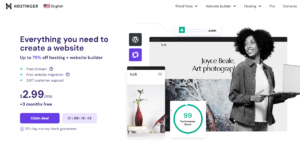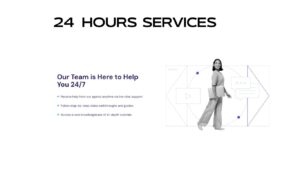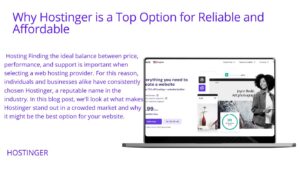


how to make a booking website
1. Research and Planning
Determine Your Specialization: Choose the kind of reservations you will manage (hotels, airlines, tours, events, etc.).
Market research: Evaluate consumer demands and rivals.
Describe the Features: Select necessary features, such as booking confirmation, user accounts, payment gateways, availability calendars, and customer support.
2. Selecting a Platform
Builders of websites: For a no-code option, use platforms such as Squarespace, WordPress, or Wix that have booking plugins.
WordPress with plugins like Easy Appointments or WooCommerce Bookings for greater flexibility is a CMS (content management system).
GET 20% MORE DISCOUNT IN HOSTINGER
Custom Development: If you’re looking for a highly customized solution, you might want to think about hiring programmers to create your website from the ground up in Python, PHP, or JavaScript.
There are various processes involved in creating a booking website, from development and deployment to planning and design. Here is a starting point guide to assist you:
1. Research and Planning
Determine Your Specialization: Choose the kind of reservations you will manage (hotels, airlines, tours, events, etc.).
Market research: Evaluate consumer demands and rivals.
Describe the Features: Select necessary features, such as booking confirmation, user accounts, payment gateways, availability calendars, and customer support.
2. Selecting a Platform
Builders of websites: For a no-code option, use platforms such as Squarespace, WordPress, or Wix that have booking plugins.
WordPress with plugins like Easy Appointments or WooCommerce Bookings for greater flexibility is a CMS (content management system). GET 20 MORE DISCOUNT IN HOSTINGER
Custom Development: Hire developers to create your website from the ground up using programming languages if you need a fully customized solution.

3. Design the Website
User Interface (UI): Design a clean, intuitive interface that is easy to navigate.
Make sure the website is mobile-friendly with responsive design.
Branding: Consistent use of colors, fonts, and logos that reflect your brand identity.
4. Create the Website Front-End Development: For the website’s visual elements, utilize HTML, CSS, and JavaScript.
Back-end development: Use a server-side language such as PHP, Python, or Node.js to handle the booking system’s logic.
Database: Create a database (such as MySQL or PostgreSQL) to hold customer information, booking details, and other important documents.
5. Include a Booking System
Booking Engine: To handle reservations, cancellations, and availability, create or incorporate a booking engine.
Payment Gateway: Include safe payment processors such as Square, PayPal, or Stripe.
Email Notifications: Program automatic emails to be sent out for cancellations, reminders, and booking confirmations.
6. Testing
Functionality Testing: Ensure all features work correctly.
Usability testing: Verify how user-friendly the website is.
Security testing: shield user information and stop illegal access.
7. Start the Website Domain and Hosting: Get a domain name and pick a trustworthy hosting company.